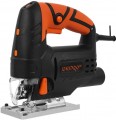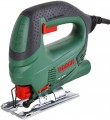Real power
The power produced by the jigsaw “at the output”, in other words, supplied to the saw blade. It is always less than the power consumption (see above) due to energy losses in the tool mechanisms. It is the useful power that is the main parameter that determines the flow Rate and suitability of a jigsaw for heavy work: the higher the power, the thicker and/or harder the material the tool can “take” and the faster it can handle the job. On the other hand, tools with higher power consume more electricity (see “Power Consumption”), and are also noticeably heavier than less powerful counterparts. Therefore, it is worth choosing a jigsaw based on power, taking into account the expected volume of work and the characteristics of the materials used.
Power consumption
The maximum electrical power consumed by the jigsaw during operation. It is worth noting that this parameter uniquely determines only the amount of electricity spent on the operation of the tool; its practical characteristics, for example, the thickness of the material and the speed of operation, depend primarily on the output power (see below). On the other hand, the output power is not always indicated by the manufacturer, and therefore a comparison by power consumption is quite acceptable — to a certain extent, it allows you to evaluate the characteristics of the tool. So, it is believed that electric jigsaws up to 600 W are enough for domestic use, and
more powerful models belong to the professional segment. For more information on selecting a jigsaw for power, see "Output Power".
Minimum frequency
The minimum stroke frequency of the jigsaw blade during operation. In some cases (for example, when working on metal), a low stroke rate is preferable to a high one; accordingly, the lower the minimum frequency, the more opportunities you will have to set up the instrument for working on a particular material.
Max. frequency
The maximum stroke frequency of the jigsaw blade during operation. The
higher the stroke rate, the higher the performance of the tool and the cleaner and more accurate the cut, usually. On the other hand, high speed is not optimal for all materials; picking up a "high-speed" jigsaw is worth it if it is planned to be used mainly for woodworking.
Also note that the characteristics of the tool usually indicate the maximum frequency at idle; at work, it is usually less. However, this parameter quite allows you to compare different tools with each other.
Pendulum action
Possibility of work of a fret saw in the mode of the
pendular course. In this mode, the working blade moves not only up and down, but also back and forth in such a way that contact with the material and sawing are carried out only when moving up. It is believed that the pendulum mode can increase the speed of work (especially when working with thick materials) and increase the life of the file. On the other hand, the quality of the cut using the pendulum stroke is worse than in the normal mode, and therefore it is not recommended to use it for precise work.
Stroke
The length of the stroke of the working blade of the jigsaw during operation. The longer the stroke, the more of the file will be in contact with the material in one movement; accordingly, at the same frequency of movement of the blade, a jigsaw with a longer stroke length will be more performant.
Wood
Maximum cutting depth in wood, in other words — the maximum thickness of a wooden workpiece that a jigsaw can handle. This parameter characterizes not only directly the maximum thickness of the material, but also the performance of the tool as a whole: the greater the depth of cut, the higher the performance. In the case of wood for domestic use, a depth of about 70 mm is considered sufficient, deeper models are usually professional.
It is worth noting that the depth of cut is usually indicated for certain files recommended by the manufacturer for a particular material. The use of other canvases does not guarantee compliance with the claimed parameters, and in some cases it is even fraught with breakdowns and injuries.
Aluminium
The maximum cutting depth when working on aluminium and its alloys, in other words, the maximum thickness of a workpiece made of these materials that a jigsaw can cut through. In general, aluminium and its alloys are softer than steel, and therefore the depth of cut through them is greater - in professional models it can reach 30 mm.
Steel
The maximum depth of cut in steel, in fact, is the maximum thickness of a workpiece made of steel or other metal of similar characteristics that a jigsaw can handle. For more information about the depth of cut, see "Wood", here we note that due to the hardness of the material, even in professional models, this parameter rarely exceeds 10 mm.

